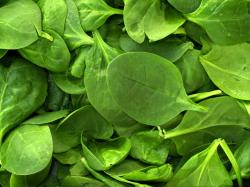Leafy Greens Marketing Agreement Adopts Significant Changes To Metrics
August 30, 2013 | 3 min to read

Sacramento, CA – The California Leafy Greens Marketing Agreement Board has approved changes to its rigorous food safety standards, or metrics, with respect to animal intrusion and composting practices.
“These actions represent a significant step forward in the evolution of food safety standards for leafy greens,” said Scott Horsfall, LGMA CEO. “The changes will provide an improved system to assess and reduce potential risk in leafy greens fields while reducing the impact of food safety metrics on the environment.”
The changes to LGMA metrics are a result of months of work throughout the leafy greens industry. The effort was led by Western Growers under the direction of Hank Giclas, Senior Vice President of Strategic Planning, Science and Technology for Western Growers, in collaboration with university scientists, industry food safety experts, farmers and shippers of leafy greens products and the environmental community.
“Throughout this process the industry has thoroughly reviewed current food safety research, talked with government regulators, met with scientists, environmentalists and industry to fully vet these new food safety standards through an open and transparent process,” explained Giclas. “The LGMA technical committee also spent a great deal of time reviewing and discussing proposed changes before making a recommendation to accept the revised metrics to the full Board.”
According to Giclas, the new metrics refocus the efforts of LGMA handlers to assessing risk of intrusion in the field from any animal rather than responding to a list of specific animals that was part of the original LGMA metrics. The new approach requires LGMA handlers to determine the level of intrusion and what kind of mitigating action should be taken. The new metrics also add a definition for green waste and requirements for composting green waste relative to the production of leafy greens.
“The change regarding animal intrusion reflects a more common sense approach to dealing with this important issue,” said Jennifer Biringer, South Central Coast Project Director for The Nature Conservancy. “Our organization has been concerned about overzealous efforts of some farmers and demands of their customers to prevent animal intrusion by using methods that are disruptive to the environment. This change in the LGMA metrics makes sense because is it focused on mitigating any real risk that may be present in the field. We are very pleased the LGMA is encouraging farmers and their customers to adhere to science-based practices that work to protect the public and nature.”
“I’ve had the opportunity to work with several leafy greens farmers who have allowed us to conduct research in their fields and I can tell you they are very conservation-minded,” said Michele Jay-Russell, veterinarian and University of California Davis researcher with the Western Center for Food Safety, who worked closely with the industry in developing the new LGMA metrics for animal intrusion. “From a food safety standpoint, what’s really important is to make sure that if there is an entry in the field by an animal that could present a potential food safety risk, there is a way to make sure product directly impacted does not get to consumers and that it is removed from the field safely. That is what the new metrics are designed to do.”
The new LGMA metrics require that all handlers have approved Standard Operating Procedures (SOPs) in place to address how signs of animal intrusion in the field will be handled. Assessments must be conducted prior to and during harvest to determine if there has been any animal intrusion in the field. If signs of animal intrusion are noted and determined to be low risk, the situation can be handled according to the company’s SOPs. If the contamination from animals is determined to present a potential food safety risk, it must be mitigated according to the LGMA metrics which require a buffer to be established around any impacted product and that portion of the field must not be harvested. The specific metrics required of LGMA members in this instance are available on-line at www.lgma.ca.gov/food-safety-practices
According to LGMA’s Horsfall, these same changes were accepted by the Arizona Leafy Greens Marketing Agreement. Compliance with these new standards will be verified through mandatory government audits for both Arizona and California handlers beginning in the late fall and winter of 2013/2014. Horsfall noted these changes will also align the LGMA metrics more closely with the upcoming federal Food Safety Modernization Act Requirements.
Both organizations plan to conduct educational workshops and other outreach activities to ensure farmers and handlers are ready to implement the new requirements.
Source: The California Leafy Greens Marketing Agreement
